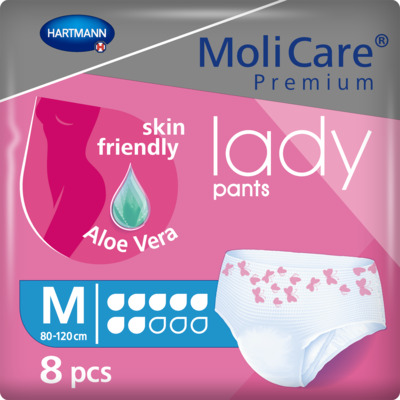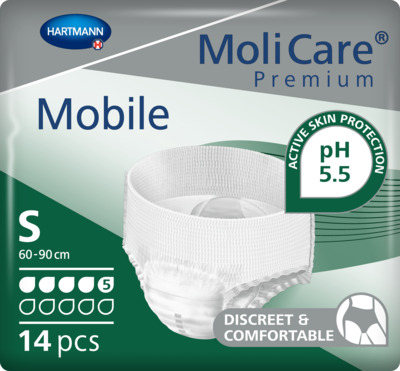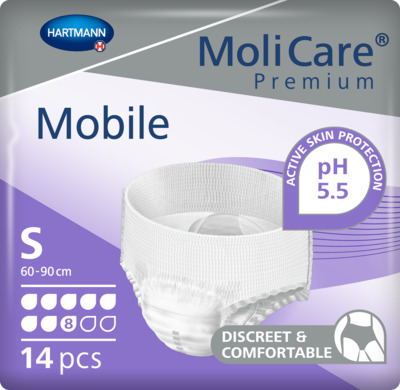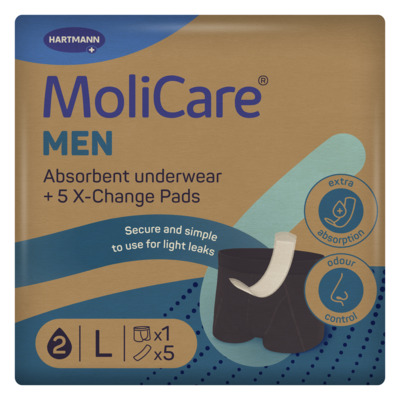Incontinence Advice
How Long Does Irritable Bowel Syndrome Last
Are you one of the 5-20% of people in the UK living with the discomfort of Irritable Bowel Syndrome, or IBS ? If so, you may be wondering, "How long does IBS last?" Irritable Bowel Syndrome is a condition that can cause a range of symptoms, from abdominal pain and bloating to constipation and diarrhoea.
If you are struggling the manage the affects of IBS, read our article and in cases of bowel leakages, we recommend MoliCare® purpose designed faecal incontinence pads or for something more discreet for feacal smearing, try MoliCare® extra long Rectangular Pads.

What Is Irritable Bowel Syndrome?
Irritable Bowel Syndrome, often referred to as IBS, is a chronic condition that affects the digestive system. It is fairly common, with one in five people in the UK experiencing symptoms of IBS at some point in their lives. Although the majority of people affected by IBS are under 50, with the average age being between 20 and 30 years old, older adults may also suffer from the condition too[ii].
What Causes IBS?
Unfortunately, doctors and experts can’t say for certain exactly what causes Irritable Bowel Syndrome. However, there is a strong connection with diet and stress. Both of which can disrupt the signals from the brain to the digestive system, causing digestive issues and potentially oversensitive nerves in the gut. If food moves too slowly through your digestive system, it can lead to constipation, whereas if it moves too quickly, it can lead to diarrhoea.
Another potential cause could be a previous infection of the gut. IBS resulting from a bacterial infection is known as post-infectious IBS, and often gradually resolves itself.
Irritable Bowel Syndrome Symptoms
Symptoms of irritable bowel syndrome tend to come and go over time and flare up in bouts. These flare ups can last for days, weeks, months, or even longer. Although it’s not certain what triggers them, experts have linked flare ups to dietary changes, medication changes and stress. Symptoms will vary from person to person, but here are some of the common irritable bowel syndrome symptoms that you should be aware of:
● Stomach pain or cramps
● Bloating
● Gas
● Irregular bowel movements
● Diarrhoea
● Constipation
● Bowel incontinence
● Tiredness
● Nausea
● Backache[iii]

Incontinence Product Finder
Selecting the right products is key in ensuring security and discretion. If you’re not quite sure what you need, try our product finder. It’ll ask you a few questions about your needs and then provide a list of recommended products that may help you.
Find Product Incontinence Product FinderWhat Is An IBS Flare Up?
An IBS flare up refers to a sudden and often unpredictable increase in the severity of symptoms associated with Irritable Bowel Syndrome, including abdominal pain, bloating, diarrhoea, and constipation. During an IBS flare up, these symptoms may worsen, causing significant discomfort and disruption to daily life. The exact triggers of IBS flare ups can vary from person to person, but common triggers include stress, certain foods or drinks, hormonal changes, and medication changes.
How Long Does An IBS Flare Up Last?
The duration of an IBS flare up can vary greatly from person to person. Generally, a flare up of irritable bowel syndrome can last from a few hours to several days. However, it is not uncommon for some people to experience symptoms for weeks or even longer. Factors such as stress, diet, medication, and lifestyle can all contribute to the length and severity of an IBS flare up. So, if you are experiencing a flare up, it is important to speak with your doctor to determine the best course of treatment and management for your symptoms.
Is There A Cure For Irritable Bowel Syndrome?
Currently, there is no known cure for Irritable Bowel Syndrome. However, there are several treatment options and management strategies available that can help alleviate symptoms and improve quality of life for those living with IBS. These include lifestyle changes, dietary changes and medications[iv].
So, although there is currently no known cure for IBS, with the help of a doctor or healthcare provider, many people with the condition are able to manage their symptoms and live a healthy and fulfilling life.
Irritable Bowel Syndrome Treatments
Although Irritable Bowel Syndrome may not be curable yet, there are plenty of treatment options that will help manage symptoms. From making quality lifestyle changes to selecting medications depending on your symptoms, here are some irritable bowel syndrome treatments you can try to relieve your symptoms:
● Dietary Changes - IBS affects the digestive system, so what you put into your digestive system will affect your symptoms. As such, some dietary changes will likely help significantly improve your symptoms. For many people, certain foods trigger flare ups of IBS symptoms, so it may be beneficial for you to keep a food diary to help identify your triggers and adjust your diet accordingly. On the other hand, many people find that a low FODMAP diet is beneficial to them, since it limits foods that are poorly absorbed in the small intestine.
● Medications - You can talk to your pharmacist or GP to find the right medications that will help manage your symptoms. For example, if you are suffering with diarrhoea a pharmacist may prescribe imodium, or they may give you Buscopan for stomach cramps. Discuss your symptoms with your pharmacist or doctor and see what medications they suggest.
● Regular Exercise - Exercising regularly can help regulate bowel movements and reduce stress levels, which can trigger IBS flare ups. Low-impact exercises such as walking, swimming, and yoga are excellent options for people with IBS.
● Relaxation Techniques - Stress can cause or exacerbate IBS flare ups, so you may find relaxation techniques beneficial to managing your symptoms. Meditation, deep breathing exercises, and guided imagery can all help reduce stress levels and alleviate symptoms.
● Incontinence Pads - Faecal incontinence pads can help you manage the unpredictable bowel movements that often occur with IBS. They can provide you with the confidence to continue your daily activities and help reduce anxiety around IBS symptoms.
● Probiotics - Probiotics are live bacteria that experts believe have several health benefits besides improving symptoms of IBS, including balancing the healthy bacteria in your gut and lowering cholesterol and blood pressure. Probiotic supplements or foods, such as yoghurt and kefir, can be effective in reducing symptoms such as bloating and gas.
You can get further support from the IBS Network, a charity supporting people living with IBS providing information and advice and working alongside healthcare professionals to facilitate self management.

Managing IBS
IBS can be a challenging condition to have, but understanding how long it lasts can help manage your symptoms and improve your quality of life. While there is currently no cure, there are several treatment options available that can help alleviate your symptoms and reduce the frequency and severity of flare ups. By working to identify triggers and taking steps to manage your symptoms, you can control your symptoms and find relief. So, if you're wondering how long IBS lasts, don't despair. With the right management strategies, you can live a healthy life despite the challenges of this chronic condition.
FAQs
How Do You Calm Down An IBS Flare Up?
There are several ways to help calm down an IBS flare up. Here are some things that may help:
● Relaxation techniques
● Regular exercise
● Dietary changes
● Probiotics
● Medications
However, what works for one person may not work for another, so we would recommend that you speak with your doctor to determine the best ways to calm down an IBS flare up.
How Long Does IBS Pain Last?
The duration of IBS pain can vary depending on how severe your condition is and individual factors, like diet and lifestyle choices. Irritable Bowel Syndrome pain can range from mild discomfort to severe and debilitating. The duration of this pain will also vary from person to person, with some experiencing intermittent pain and others experiencing constant pain.
Generally, IBS pain can last anywhere from a few minutes to several hours. However, in some people, the pain may persist for several days or even longer. If you are experiencing persistent or severe Irritable Bowel Syndrome pain, you should speak to your doctor to find the best course of treatment for your pain.
Can IBS Go Away On Its Own?
There is no cure for Irritable Bowel Syndrome, but symptoms can improve and even go away on their own. In some cases, IBS may be a temporary condition that resolves on its own, while in other cases, symptoms may persist over the long term.
Factors such as stress, diet, and lifestyle can all play a role in the severity and duration of IBS symptoms. Making changes to these factors can help to manage symptoms and potentially even alleviate them over time.
Sources
[i] National Institute for Health and Care Excellence. (2023). Irritable bowel syndrome - Prevalence. Retrieved March 27, 2023, from https://cks.nice.org.uk/topics/irritable-bowel-syndrome/background-information/prevalence/
[ii] National Institute for Health and Care Excellence. (2008). Irritable bowel syndrome in adults: diagnosis and management. Retrieved March 27, 2023, from https://www.nice.org.uk/guidance/cg61/chapter/introduction
[iii] Circle Health Group. (n.d.). IBS facts for sufferers. Retrieved March 27, 2023, from https://www.circlehealthgroup.co.uk/health-matters/womens-health/ibs-facts-for-sufferers
[iv] König, J., Brummer, R. J., & Ristow, M. (2013). Irritable bowel syndrome: pathogenesis, diagnosis, treatment, and evidence-based medicine. World Journal of Gastroenterology, 19(46), 8284–8295. doi: 10.3748/wjg.v19.i46.8284. Retrieved March 27, 2023, from https://www.ncbi.nlm.nih.gov/pmc/articles/PMC3921083/

MoliCare® Premium Lady Pants 7 Drops
<h2>Comfort and Confidence</h2> <p>Experience the comfort and confidence of MoliCare® Premium Lady Pants, specially crafted for moderate incontinence. These slimline and discreet incontinence pants feel just like regular underwear, but they offer superior dryness and protection you can trust from MoliCare®.</p> <p>If 7 drops is too much or too little, we still have plenty of other MoliCare® Premium Lady pants, available in different drop capacities, to suit your every incontinence need. Whichever you go for, our Premium Lady Pants provide the ideal support for your moderate incontinence needs, empowering you to carry on with your daily activities worry-free.</p> <h2>Discreet fitting incontinence pants</h2> <p>The Premium Lady Pants are thoughtfully designed with a lower waistline, ensuring a discreet fit under your clothes. The soft, pH-balanced, and breathable material embraces your body, providing maximum comfort. The quick-drying central layered core rapidly absorbs and locks away moisture, keeping you dry and comfortable throughout the day. Additionally, the Aloe Vera treated top sheet safeguards delicate skin.</p> <p>Worried about leaks? Don't be. Our Premium Lady Pants feature elasticated cuffs that protect against leakage, and special neutralisers seal in odours, leaving you feeling confident, dry, and fresh.</p> <p>These incontinence pants cater to active women as well as those with reduced mobility, providing reliable protection against moderate bladder weakness.</p> <h2>Choosing your Size</h2> <p>Measure waist at the largest width between the waist and hips. Select the product size based on the below sizing.</p> <ul> <li>Medium: 31-47 inches (80-120cm)</li> <li>Large: 47-59 inches (100-150cm)</li> </ul> <h2>Fast delivery</h2> <p>Managing incontinence doesn't have to be a hassle. Our delivery service ensures you receive the products you need right at your doorstep. With easy online reordering and fast shipping, we even offer free delivery on orders over £50.</p> <p>If you have any questions or need assistance, our friendly customer service team is here to help. Just give us a call at 0800 028 9470 to discuss your requirements. Discover the comfort, confidence, and convenience of MoliCare® Premium Lady Pants today.</p>
MoliCare® Premium Mobile 5 Drops
<h2>MoliCare Premium Mobile 5 Drops: The Solution for Incontinence</h2> <p>Experience the ultimate solution for managing moderate to very severe incontinence with MoliCare® Premium Mobile 5 Drop incontinence pants. These innovative pull-on pants provide the look and feel of ordinary underwear, ensuring discreetness and exceptional protection.</p> <p>With your comfort and security in mind, the discreet and adaptable design of MoliCare® Premium Mobile pants conforms to the shape of your body.</p> <p>The pH-balanced formulation ensures effective skin protection, preserving the natural balance and health of your skin. Featuring a three-layer absorbent core, these pants lock away urine, providing dryness and ensuring you stay comfortable and confident. The anti-leakage system offers extra security and protection, preventing any leaks or accidents. Odour neutralisers are added to provide long-lasting freshness and confidence, eliminating unwanted odours.</p> <h2>High Absorption Capabilities</h2> <p>MoliCare® Premium Mobile 5 Drop pants provide superior absorption capabilities, making them the perfect choice for managing moderate incontinence. With varying levels of absorbencies available, you can choose the one that suits your specific needs. The breathable fabric, anatomical shape, and absorbent core keep moisture away from your body, keeping your skin dry. Enjoy the convenience of easy removal with the quick tear-open sides of MoliCare® Premium Mobile pants, which is even suitable for those with severe bladder weakness!</p> <h2>Choosing your Size</h2> <p>Measure waist at the largest width between the waist and hips. Select the product size based on the below sizing.</p> <p>Small: 24-35 inches (60-90cm)</p> <p>Medium: 31-47 inches (80-120cm)</p> <p>Large: 39-59 inches (100-150cm)</p> <p>Extra Large: 51-67 inches (130-170cm)</p> <p>Fast, reliable delivery service for all your essential <a href="https://www.hartmanndirect.co.uk/" style="color:#0563c1; text-decoration:underline">HARTMANN Direct</a> incontinence products straight to your door. Take advantage of our convenient online ordering system and benefit from our price match promise, along with free delivery on orders over £50. Our friendly customer service team is here to assist you in selecting the right product for your needs.</p> <p> </p>
MoliCare® Premium Mobile 8 Drops
<h2>Comfort and Protection with MoliCare® Premium 8 Drops</h2> <p>MoliCare® Premium 8 Drops are the perfect solution for managing moderate to very severe incontinence with the utmost comfort and protection. These innovative Premium Mobile incontinence pants are designed to resemble normal underwear while providing the superior quality you expect from MoliCare®.</p> <h2>Discretion with MoliCare®</h2> <p>Reliability is at the forefront of these MoliCare® Premium 8 Drop pads. The discreet design of these pants adapts to the shape of your body, ensuring a comfortable and secure fit. They are pH-balanced to help protect your skin from irritation and maintain its health. The unique absorbent core contains Super Absorbent Polymers (SAP) which are exceptionally efficient at locking away moisture and urine, guaranteeing dryness and freshness.</p> <h2>Say goodbye to unpleasant odours.</h2> <p>Our Premium 8 Drops incontinence pants are equipped with effective odour neutralisers, ensuring long-lasting freshness and confidence throughout the day. The superior absorption capabilities of these incontinence pants make them a reliable choice for managing moderate to very severe incontinence.</p> <p>When it comes to convenience, our pull-on disposable Premium Mobile incontinence pants are designed for easy removal. The quick tear-open sides allow for hassle-free changes, to maintain comfort and convenience. These pants are effective for managing even very severe bladder weakness and are available in numerous sizes.</p> <h2>Choosing your Size</h2> <p>Measure waist at the largest width between the waist and hips. Select the product size based on the below sizing.</p> <p>Small: 24-35 inches (60-90cm)</p> <p>Medium: 31-47 inches (80-120cm)</p> <p>Large: 39-59 inches (100-150cm)</p> <p>Extra Large: 51-67 inches (130-170cm)</p> <h2>Delivery service</h2> <p>Fast, reliable delivery service for all your essential <a href="https://www.hartmanndirect.co.uk/" style="color:#0563c1; text-decoration:underline">HARTMANN Direct</a> incontinence products straight to your door. Take advantage of our convenient online ordering system and benefit from our price match promise, along with free delivery on orders over £50. </p> <p><strong>Need more help?</strong> Our friendly customer service team are waiting to help you choose the right product – call 0800 028 9470.</p>
